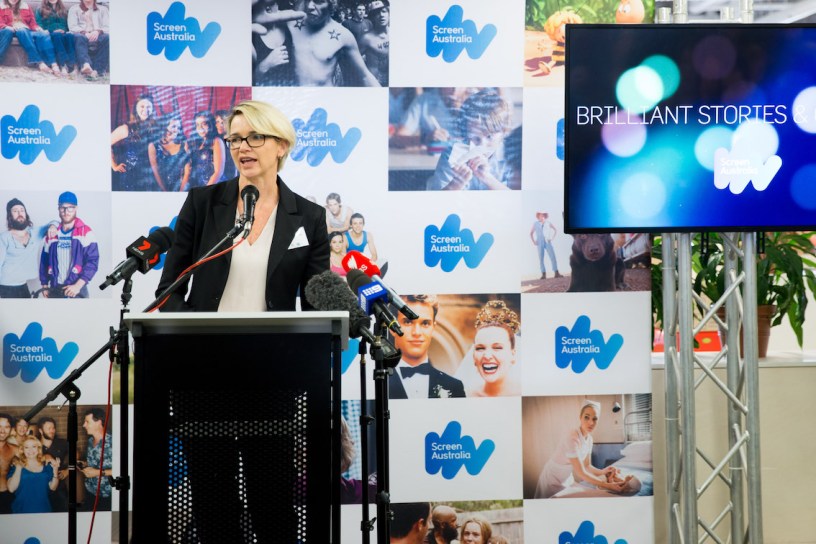The 58 recipients of Screen Australia's Gender Matters: Brilliant Stories and Brilliant Careers funding, designed to address the gender imbalance in the screen industry, have been unveiled.
$3 million will be shared among 45 female-helmed film, TV and online projects and 13 career boosting initiatives. The announcement marked the largest cohort of projects funded in a single day in Screen Australia's history.
Screen Australia started the Gender Matters program late last year in response to the industry’s gender inequity in key creative roles. In film, women make up around 32 per cent of producers, 23 per cent of writers and 16 per cent of directors.
Screen Australia chief operating officer Fiona Cameron said Gender Matters was unashamedly providing “express lane” access to female business ideas and stories.
“The funding boost provided by Screen Australia has been a game-changer, providing the industry with an opportunity to get behind some very commercial and creative prospects. It’s now time for action,” said Cameron.
Projects funded under Brilliant Careers had to pass the “three tick test”; that is, they had females in three of the four key creative roles – producer, writer, director and protagonist.
Included among the film slate is Rachel Griffith’s feature directorial debut Run Like A Girl, the story of Michelle Payne, the first woman to win the Melbourne cup; Baby Cat from NSW Young Australian of the Year, Genevieve Clay-Smith; and Girls in Hotels, the work of Dollhouse Pictures’ Gracie Otto and Jessica Carrera, along with writer Lee Tulloch.
Writer and actor Nakkiah Lui (Black Comedy) received funding to adapt her 2015 Belvoir play Kill the Messenger for film.
Lui said she was excited to move into features and was humbled to have the support of the industry.
“Demographically society is shifting, and if we don’t see the people that we see when we walk down the street on our screens, what future does our industry have? These types of funding initiatives are necessary for our industry to survive and to be culturally competitive,” she told IF.
Crime drama Overflow, written by Elise McCredie and produced by Claudia Karvan, was among the 16 television concepts greenlighted.
Karvan said she took her hat off to those behind Gender Matters, noting it was often easy for successful women in the industry to become apathetic about gender equality.
“It may be disguised by the fact that there are so many flourishing female careers, but the bottom line is around 20 per cent of the voice of our industry is female. It shouldn’t be like that,” she told IF.
Other TV projects include I Am Woman, a two-part series on Germaine Greer’s life before she wrote The Female Eunuch, directed by Daina Reid and written by Alicia Gwinner, and washed up superhero taleThe Elementals by Diana Glenn, Kat Stewart and Jane Harber.
Rachel Ward will also direct eight-part series Propinquity, following the story of 19th century suffrage activist Vida Goldstein.
While many of the projects greenlighted include big nametags such as Ward, Karvan and Griffiths, nearly 20 per cent of successful applicants have no prior professional credits and would not normally be eligible for Screen Australia funding. They include 27 new directors and 46 new writers.
“What is significant is not just the number of applications we have been able to attract and support, but that the Gender Matters program has opened up funding opportunities for applicants who might otherwise fall out of the established structures,” said Gender Matters task force chair Deanne Weir.
“By opening the door a little wider, Screen Australia is showing faith in the potential of many female filmmakers. I absolutely believe that the opportunities being created today will have a resounding effect on our screen industry for many years to come.
The Brilliant Careers fund supports programs that will generate sustainable careers in the screen industry for women; identify gaps in career development pathways for female creatives; and support slates of projects and businesses that connect content to audiences.
Among the successful initiatives is Smart for a Girl: Roar, helmed by producer Imogen Banks (Offspring) and writer Alice Bell (Puberty Blues, The Beautiful Lives). It will see 12 uncredited female writers mentored through the process of developing a TV series through to network pitch.
Banks told IF there was an "absolute" demand for female-led stories. However, difficulties exist in giving emerging female writers the experience to deliver on that demand – something she hoped Smart for a Girl will tackle.
“We saw a core need, and saw a simple and clear way of addressing it,” said Banks.
The Australian Directors Guild also received funding to place 12 emerging female directors into film and TV projects, aiming to give them relevant credits and real directing opportunities.
Brilliant Stories and Brilliant Careers form part of the broader $5 million Gender Matters program, which aims to ensure Screen Australia’s funding is targeted to creative teams (writer, producer, director and protagonist) that are at least 50 per cent female by the end of 2018.
For the full list of recipients, visit the Screen Australia website: http://www.screenaustralia.gov.au/



